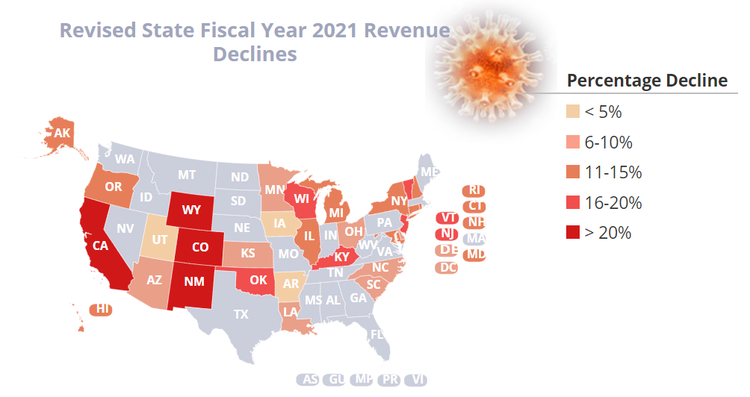Where the future of local and state government revenues is looking grim, they are also faced with some serious cuts to produce a balanced budget for the next fiscal year. The recent example is New York City’s proposed budget, which introduced some serious spending cuts to services like cultural affairs and after-school programs to make up for over $9 billion in lost revenues due to COVID-19.
In this article, we will take a closer look at the various budget cuts that cities and counties are proposing and how they may impact the municipal debt world.
Be sure to check out our Education section to learn more about municipal bonds.
Lost Revenues, Federal Aid and Spending Cuts

Now, what does this lost revenue entail?
- Sales Tax Revenue Receipts: As previously mentioned, sales tax revenues are directly attributed to consumer spending and consumer sentiment towards economic conditions. Given the shelter-in-place orders and many states dialing back on their reopening efforts, unemployment numbers are likely to increase; when paired with people working from home and high unemployment numbers consumer spending is likely to be low, leading to a significant decrease in sales tax revenues for state and local governments.
- Property Taxes: The impacts on this revenue source is still somewhat unknown, as new property assessment valuations will start in the beginning of the next calendar year. Many counties throughout the United States aren’t allowing any property tax deferrals, and there haven’t been any indicators that show an adverse impact to the property values. This means that property tax revenues are likely in good shape right now, though this may all change if the shutdown persists.
- Transient Occupancy Tax: This is the hardest-hit revenue source for many local governments, and especially challenging for cities and counties that are heavily dependent on the tourism sector. The new data shows that over 70% of hotel staff have been laid off. Transient Occupancy tax is primarily charged on hotel stays, and given the impact of the coronavirus on travel, both business and personal, the hotel industry is struggling.
Use our Screener to find the right municipal bonds for your portfolio.
Understanding the New Normal
Here are some of the key guiding philosophies for a local government and its constituents:
- Link between revenues and services provided: The local government leaders will need to craft a financial framework to showcase upcoming challenges and effectively communicate the tax revenues and how they tie to the services provided to the communities.
- Service priorities: Elected officials and the executive/leadership staff of any local government must build financial planning towards service priorities to meet the larger needs and expectations of the community.
- Long-term impacts of expenditure commitments: It’s imperative to forecast and properly understand the financial detriment before deciding on any new expenditure commitments. This will be the key for local governments to weather the storm.
- Tapping into the Reserves: One of the main learnings from the 2008 financial meltdown was financial preparedness. For many of the local governments, this came in the shape of setting up reserve portfolios – which are similar to savings accounts and only to be used under board/council directives and in financial downturns – especially when revenues are shot. Financial reserves will come in handy for many local governments and you will see more and more governments tap into their financial reserves and pair that with cutting expenditures.
Want to learn more about the potential impact of COVID-19 on local and state governments? Click here.
The Bottom Line
Sign up for our free newsletter to get the latest news on municipal bonds delivered to your inbox.
Disclaimer: The opinions and statements expressed in this article are for informational purposes only and are not intended to provide investment advice or guidance in any way and do not represent a solicitation to buy, sell or hold any of the securities mentioned. Opinions and statements expressed reflect only the view or judgement of the author(s) at the time of publication and are subject to change without notice. Information has been derived from sources deemed to be reliable, the reliability of which is not guaranteed. Readers are encouraged to obtain official statements and other disclosure documents on their own and/or to consult with their own investment professionals and advisers prior to making any investment decisions.

